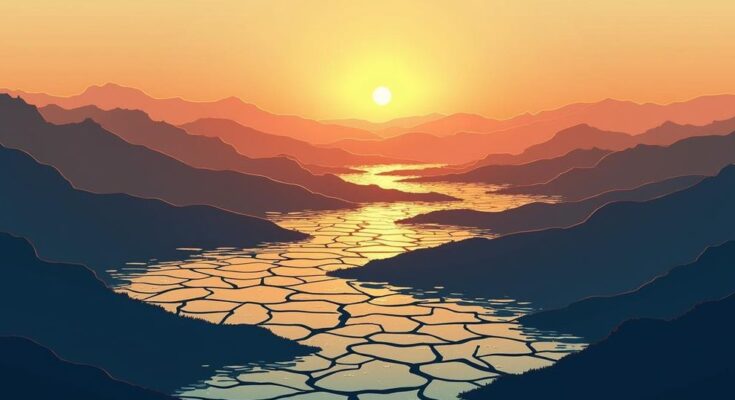In 2023, the world faced the driest year for rivers in thirty years, compounded by record heat and reduced water flows. Glaciers experienced severe mass loss, threatening long-term water security for millions. The findings raise significant concerns regarding access to water, with projections indicating worsening conditions in the coming decades. Enhanced data collection and management are critically needed to address the ongoing challenges of water scarcity and climate change.
In 2023, the world experienced the driest year for rivers in over thirty years, as reported by the United Nations weather agency, the World Meteorological Organization (WMO). The combination of record-high temperatures and diminishing water flows has precipitated extended drought conditions in various regions. The WMO’s recent report highlights that glaciers, vital to many of the world’s river systems, have undergone their most significant mass loss in five decades, raising alarms regarding future water security for millions. WMO Secretary-General Celeste Saulo remarked, “Water is the canary in the coalmine of climate change. We receive distress signals in the form of increasingly extreme rainfall, floods, and droughts which wreak a heavy toll on lives, ecosystems, and economies.” She indicated that rising temperatures contribute to a more erratic hydrological cycle, producing excessive rainfall in some areas while leading to droughts in others. The report encompasses a thorough examination of water conditions, including rivers, lakes, groundwater, and glaciers. According to UN Water data cited by the WMO, an estimated 3.6 billion individuals lack adequate access to water for at least one month each year, with projections estimating that this number may reach 5 billion by 2050. The report also disclosed that approximately 70% of the water drawn from these systems is utilized for agricultural purposes. The year 2023 registered as the hottest in recorded history, prompting concerns about the repeat of such extreme climatic events in 2024. “In the (last) 33 years of data, we had never such a large area around the world which was under such dry conditions,” stated Stefan Uhlenbrook, director of hydrology, water, and cryosphere at the WMO. Regions notably affected by drought include the southern United States, parts of Central America, and several South American nations, including Argentina, Brazil, Peru, and Uruguay. Furthermore, the Mississippi River basin recorded its lowest water levels historically. The ongoing dry conditions have adversely affected river navigation in Brazil and contributed to a food crisis in Zimbabwe and other southern African countries. The WMO has urged for enhanced data collection and sharing to enable more accurate assessments of water resources and aid communities in responding effectively to these critical challenges.
This article focuses on the alarming state of global water resources as detailed in the WMO’s report, which indicates that 2023 marked an unprecedented decline in river flows worldwide, a trend exacerbated by climate change. The report not only highlights the impact of weather on rivers but also assesses the broader implications for human populations, agriculture, and ecosystems due to decreased water availability. The urgency of this situation is underscored by projections for future water scarcity and the necessity of improved data management and response strategies.
The findings presented by the World Meteorological Organization indicate a grave situation with the world’s rivers experiencing unprecedented drought conditions, primarily fueled by climate change. The loss of glacier mass, erratic weather patterns, and increased water scarcity threaten ecological and human systems on a global scale. Immediate action and improved data management are imperative to address the challenges posed by these extreme hydrological issues, which affect billions of people and vital ecosystems.
Original Source: apnews.com




